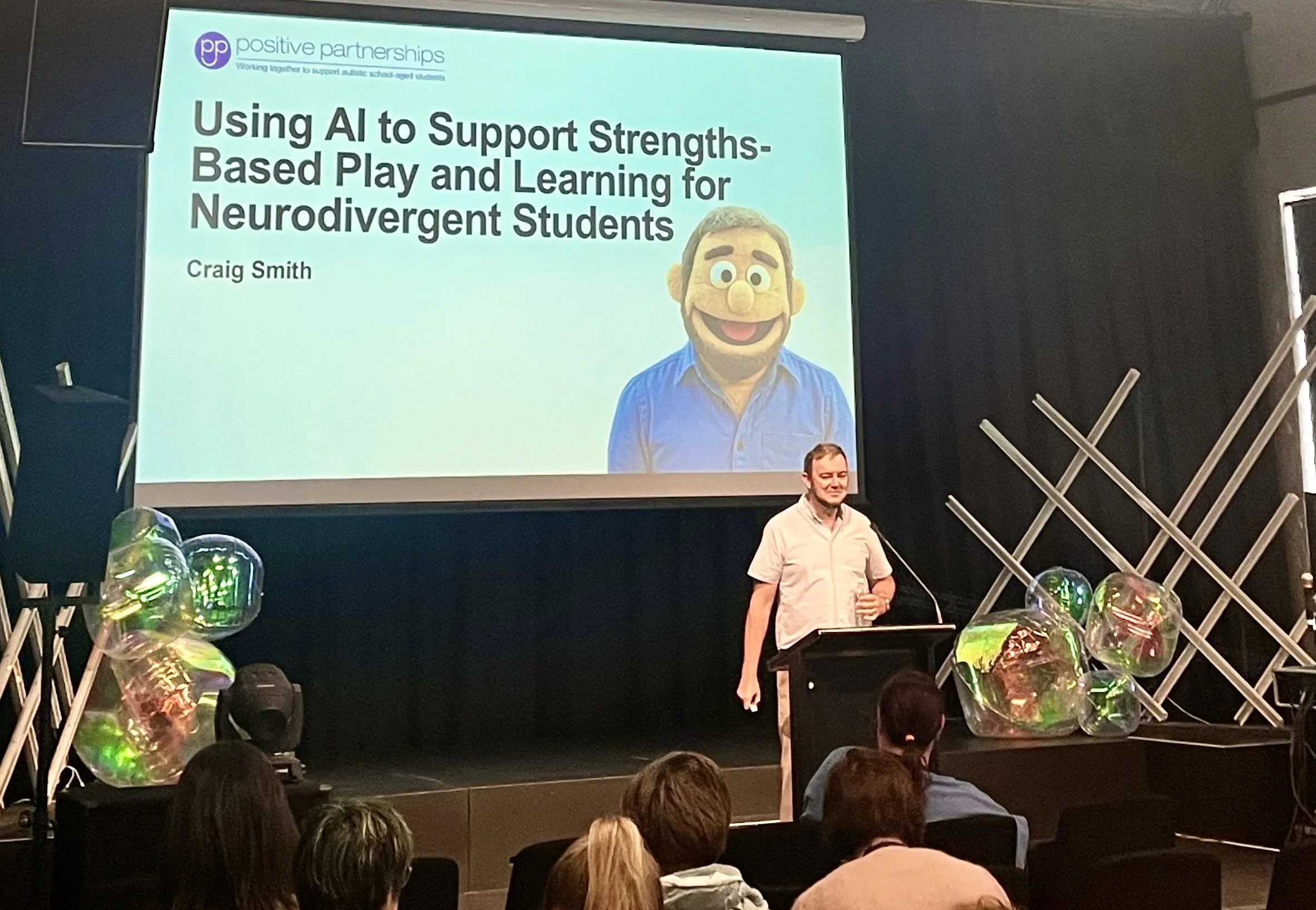These tools use AI to generate ideas and strategies to support a few common inclusive learning needs. They are experimental - see how you go and get in touch with me if you have any thoughts or feedback. Please use your own experience, insight and ethics when using them: results will vary. Tinker and play. I also have more resources for you to explore below.
I was pleased to be able to present at the Positive Schools conferences across Australia - this is the talk I gave, Human-Centred Approaches to AI: Supporting Neurodivergent Minds in the Classroom. I recorded a desk version of the talk for those who didn’t attend the conference that you can watch here.
I’ve updated the following page with some resources that expand on this talk: here.
I recently presented at a conference in Tasmania on Using AI to Support Strengths-Based Play and Learning for Neurodivergent Students.
It’s a decent summary so far of my thoughts and work in this space, so if you’d like to sit back and take in twenty minutes of me chatting about this stuff, you could start here :)
I gave a talk at TEDxCooksHill on how AI can be used to support daily executive functioning goals. The focus of the talk is my ‘Rhythm, Insight, Play’ model, a way of walking and talking intentionally with AI.
You can watch a recording of my talk here, and please feel free to chat more with me about this approach to utilising AI to support executive functioning.
I’m always eager to hear innovative ways you might be using this tech too :)
Prompts and Projects
I am building a library of generative AI prompts to help support educators across different domains of inclusive teaching.
My idea here is that by crafting prompts for AI that address specific challenges and scenarios in inclusive education, educators are, in essence, engaging with the core principles of inclusivity, such as differentiation, accessibility, and personalised learning.
There are also real-world creative projects I’ve developed using a range of AI tools. Take a look:
Rhythm, Insight, Play
I’ve pulled together a collection of AI-fuelled routines and processes that I’m calling the ‘Rhythm, Insight and Play’ model. It’s not really a model, it’s more a series of examples of how I use daily and weekly conversations with generative AI.
Take a look at how I have created a cyclical flow where I engage in Rhythm discussions focused on executive functioning needs; Insight analysis to find trends in daily notes; and Play to let the mind experiment and fly.
AI Support for Neurodivergent Teens
This resource supports young people in secondary school who are moving into post-school academic settings like university and TAFE. It was created to support a webinar on the same topic hosted in collaboration with Neurodiversity Academy.
Included are ideas to support core executive functioning needs, as well as links and an accompanying presentation.
Strengths-Based Learning and Play
This page provides a range of resources to support different play-based models that you can use in the classroom (or at home) to support communication and interaction. I also include templates for you to design your own play experiences, as well as links and resources to inspire further thinking in this space.
This year, I have delivered two webinars on artificial intelligence and inclusive education. The recordings are below.
The ‘Practical AI’ webinar below is very hands-on, looking at different parts of a day in the life of teachers, students and families; the other recording focuses half on ethics and policy, and half on practical applications in education.
I have been publishing articles to support these webinars on my LinkedIn if you’d like to explore this content further.
Quarterly journal
I’ve launched a new free quarterly Substack journal. It is a deep dive into AI, neurodiversity, psychogeography, music, and philosophy. I try to engage with themes that intertwine personal knowledge management with the richness of human experience and creativity.
Ten Inclusive Strategies for Pre-Service Teachers
The practical toolbox of inclusive education strategies I share each year with pre-service teachers.
Interviews and Demonstrations
From time to time I am interviewed about AI and neurodivergent learners. I also record experiments and demonstrations, as well as host conversations on inclusion. The recordings of some of these can be viewed below.
Building communication success for autistic children with Proloquo: webinar hosted by Craig Smith at Apple HQ.
This is a recording of a live webcast hosted by Apple in Sydney. I was on conversation with David Niemeijer and Erin Sheldon from AssistiveWare who develop Proloquo2Go.
Towards the end of the session, we discuss the implications for AI in AAC (Augmentative and Alternative Communication) regarding language use and acquisition.
ChatGPT + Apple Maps = sensory audit for excursions.
This is a demo of how I use ChatGPT and Apple Maps to conduct sensory, safety and accessibility audits for community outings to help prepare students for different environments.
I can see workflows like this being useful as a learning opportunity to help new educators have a dialogue around this sort of planning, and as a way to check out environments you aren't physically able to visit before an outing.
Walking and Talking with AI - Interview with ABC Radio
This is a brief radio interview I did with ABC Radio in Newcastle with Jenny Marchant on the topic of walking and talking with AI, building on the topic of my TEDx talk.
At the end of the conversation I share a story about how my mum used to brush her hair before the nightly news reporter came on the television when she was young, just in case the news reporter could see her through the screen. She wanted to look neat and polite. I draw a parallel between this inclination and the polite manners we use with chat bots.
The Loop Podcast - AI and Executive Functioning
This is an interview I enjoyed on The Loop Podcast hosted by Ben Woodrow-Hirst at The University of Staffordshire. We discussed neurodivergent lived experience and executive functioning strategies in relation to not only advanced technologies like AI but also virtual and augmented reality.
AI and the Neurodivergent Brain
This is a conversation that Will Wheeler from Neurodiversity Academy conducted with me on his Neurodivergent Mates podcast. We talked about AI and the practical strategies that it can provide for executive functioning support, as well as ethical considerations for privacy, some of the early implications for people having relationships with chatbots, and more. A webinar I facilitated with Will can be found on the ‘AI Support for Neurodivergent Teens’ page on this website.
Further reading:
Craig is a teacher and consultant for special education, accessibility and technology. He is currently a national manager of an Australian autism education project and has in recent years delivered seminars in Dubai, United Nations workshops in Shanghai, masterclasses in South Africa and Singapore and speaking tours of New Zealand. Outside of education he is a recognised composer, author and photographer. He lives in Hamilton with his wife and two children.
I’m funding the running of these AI tools from my own pocket because I want to make them easily accessible to everyone. If they stop working for the month, it’s because I’ve hit my personal budget limit for costs. Any donation you can make will help keep these tools running longer, if not only for yourself then for others who benefit from them ♡








